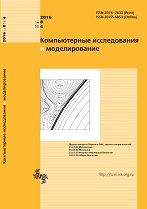|
This article is cited in 4 scientific papers (total in 4 papers)
MODELS OF ECONOMIC AND SOCIAL SYSTEMS
Consideration of psychological factors in models of the battle (conflict)
V. V. Shumov
Department borderlogy of International Informatizational Academy,
3/5 Leningradsky Ave., Moscow, 125040, Russia
Abstract:
The course and outcome of the battle is largely dependent on the morale of the troops, characterized by the percentage of loss in killed and wounded, in which the troops still continue to fight. Every fight is a psychological act of ending his rejection of one of the parties. Typically, models of battle psychological factor taken into account in the decision of Lanchester equations (the condition of equality of forces, when the number of one of the parties becomes zero). It is emphasized that the model Lanchester type satisfactorily describe the dynamics of the battle only in the initial stages. To resolve this contradiction is proposed to use a modification of Lanchester's equations, taking into account the fact that at any moment of the battle on the enemy firing not affected and did not abandon the battle fighters. The obtained differential equations are solved by numerical method and allow the dynamics to take into account the influence of psychological factor and evaluate the completion time of the conflict. Computational experiments confirm the known military theory is the fact that the fight usually ends in refusal of soldiers of one of the parties from its continuation (avoidance of combat in various forms). Along with models of temporal and spatial dynamics proposed to use a modification of the technology features of the conflict of S. Skaperdas, based on the principles of combat. To estimate the probability of victory of one side in the battle takes into account the interest of the maturing sides of the bloody casualties and increased military superiority.
Keywords:
model battlefield, function technology of the conflict, the function of representation and perception, psychology of combat, social and information management and confrontation.
Received: 20.04.2016
Revised: 17.11.2016
Accepted: 05.12.2016
Citation:
V. V. Shumov, “Consideration of psychological factors in models of the battle (conflict)”, Computer Research and Modeling, 8:6 (2016), 951–964
Linking options:
https://www.mathnet.ru/eng/crm39 https://www.mathnet.ru/eng/crm/v8/i6/p951
|

| Statistics & downloads: |
| Abstract page: | 315 | | Full-text PDF : | 203 | | References: | 38 |
|




 Contact us:
Contact us: Terms of Use
Terms of Use
 Registration to the website
Registration to the website Logotypes
Logotypes








 Citation in format
Citation in format 